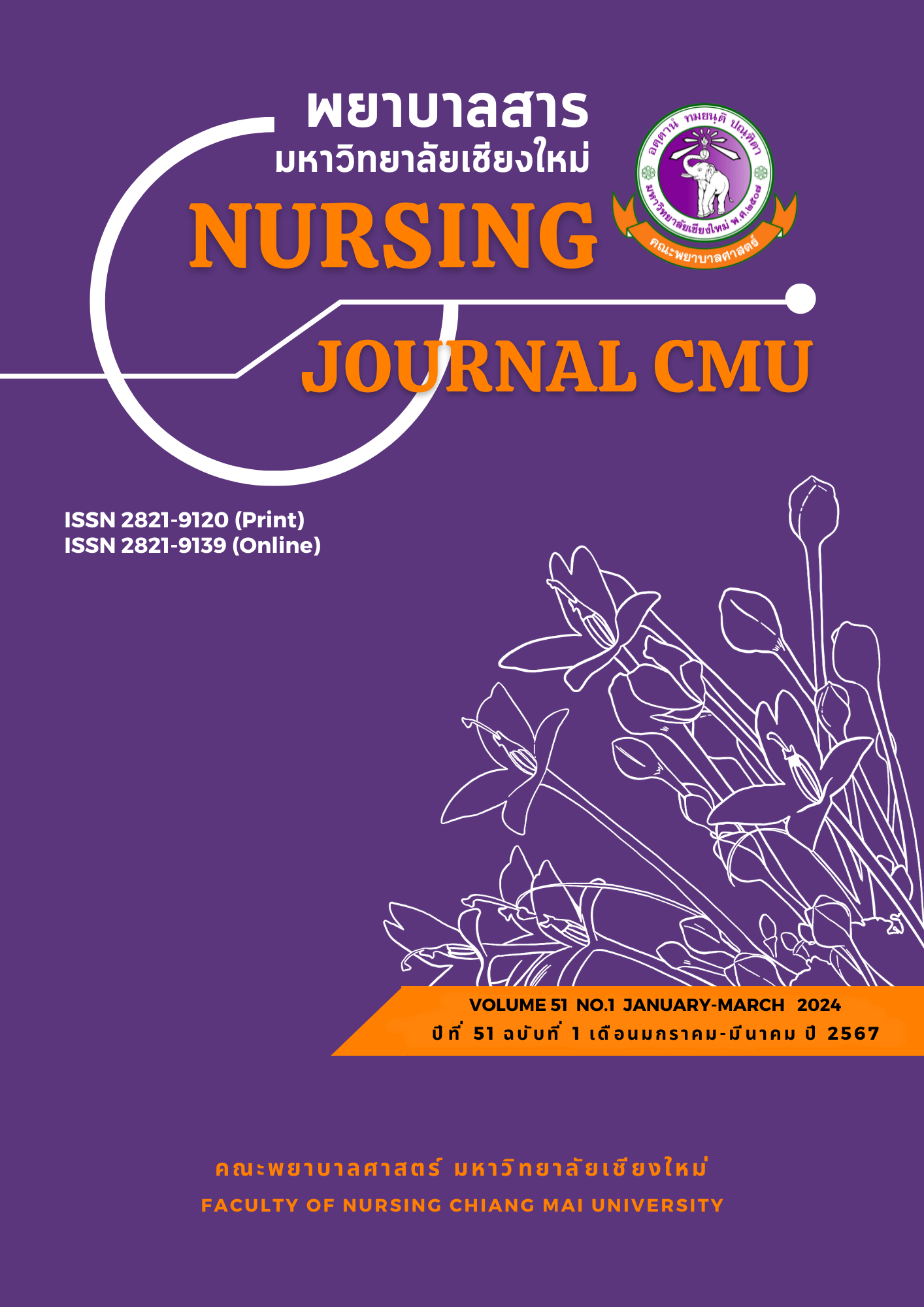The Effects of a Health Belief Model–based Program on Tuberculosis Preventive Behaviors Among Male Prisoners
Keywords:
Health Belief Model–based program, TB preventive behavior, Male prisonerAbstract
Tuberculosis (TB) infection rates among prisoners typically tend to increase. TB prevention is, therefore, important. This study quasi-experimental research used a pretest-posttest design with a comparison group. The purpose of the research was to study the effects of a Health Belief Model–based program on TB preventive behaviors among male prisoners. The sample of male prisoners was divided into an experimental group and a comparison group, each with 36 participants. The experimental group underwent 4 weeks of the Health Belief Model–based program for TB prevention with the results measured after the 4 weeks. The research tools consisted of the Health Belief Model-based program; a general information questionnaire; and the TB prevention behaviors questionnaire, the reliability of which was .80. Data were analyzed by descriptive statistics, independent t-test, and paired t-test.
The results show that the experimental group had an average score for TB prevention behaviors (M = 3.39, SD = .102) higher than before the experiment (M = 3.19, SD = .137) and higher than that of the comparison group (M = 3.14. SD = .116) with a statistically significant difference (t = 6.96, p < .001; t = 9.77, p < .001, respectively)
The study results are beneficial for nurses working in prisons and other staff who are involved to apply this perception-enhancing program to prevent TB infection in prisons effectively.
References
Amin, M. A., Wahyudi, A. S., & Nursalam, N. (2020). The effect of health coaching-based health belief model on preventing the pulmonary tuberculosis transmission at Puskesmas Karang Taliwang and Ampenan West Nusa Tenggara. International Journal of Nursing and Health Services, 3(4), 494-500.
Arsaman, J., & Sirisopon, N. (2020). The effectiveness of the "STOP TB" program in accordance with health belief model to promote behaviors the prevention of infection transmission of pulmonary tuberculosis patients. Journal of Disease Control, 46(4), 451-460. (in Thai)
Bureau of tuberculosis, Department of Disease Control, Ministry of Public Health. (2018). National tuberculosis control program guideline, Thailand 2018. Aksorn graphic design. (in Thai)
Bureau of Tuberculosis, Department of Disease Control, Ministry of Public Health. (2021). Report of tuberculosis in Thailand year 2016-2021. Aksorn Graphic Design. (in Thai)
Department of Disease Control, Ministry of Public Health. (2021). Thailand operational plan to end tuberculosis (2017-2021). Aksorn graphic design. (in Thai)
Green, L. W., & Kreuter, M. W. (2005). Health program planning: An educational and ecological approach (4th ed.). McGraw-Hill Education.
Heydari, A., Ramezankhani, A., Hatami, H., & Soori, H. (2012). The effect of health belief model (HBM) based health education on promotion of self-care behaviors of patients with smear-positive pulmonary TB in Sistan Regionin 2011. Journal of Zabol University of Medical Sciences and Health Services, 4(1), 69-83. https://sid.ir/paper/203545/en
Jadgal, K. M., zareban, I., Alizadeh-Siuki, H., & Izadirad, H. (2014). The impact of educational intervention based on health belief model on promoting self-care behaviors in patients with smear-positive pulmonary TB. Iran Journal of Health Education and Health Promotion, 2(2), 143-152. http://journal.ihepsa.ir/article-1-147-en.html
Khotcha, P., Therawiwat, M., Imamee, N., & Chandanasotthi, P. (2009). Tuberculosis education program for male prisoner TB patients in medical correctional institute. Journal of Health Education, 32(111), 42-58. https://repository.li.mahidol.ac.th/handle/123456789/71596 (in Thai)
Kosecrattanapiban, J. (2013). Results of multimedia applications program for learning knowledge, perception of health beliefs and behaviors to prevent the spread of infection in patients with pulmonary tuberculosis who received services from song department at Phaarjunphun Ajaro Hospital. Journal of Nurses Association of Thailand North-Eastern Division, 31(3) ,170-177. https://he01.tci-thaijo.org/index.php/jnat-ned/article/view/16748/15138 (in Thai)
Montaisong, M., Kummabutr, J., & Thongbai, W. (2017). The factors predicting tuberculosis preventive behaviors among the tuberculosis contacts in the Bangkok area and perimeter. Journal of the Royal Thai Army Nurses, 18(Suppl.), 306-314. https://he01.tci-thaijo.org/index.php/JRTAN/article/view/101708/78776 (in Thai)
Pender, N. J., Murdaugh, C. L., & Parsons, M. A. (2006). Health promotion in nursing practice. Pearson Education.
Sangpech, V., Vaeteewootacharn, K., & Suwannaphant, K. (2018). Factors associated with tuberculosis prevention among prisoners in the prison, Bueng Kan Province 2017, Thailand. Journal of the Office of DPC 7 Khon Kaen, 25(3), 99-108. (in Thai)
Saraboon, R., & Muangsom, N. (2012). An application of health belief model and social support for promoting preventive behaviors among pulmonary tuberculosis patients in Wangsaphung Hospital, Loei Province. KKU Institutional Research Journal, 12(3), 29-37. (in Thai)
Srisatidnarakul, B. (2020). Effect size, power analysis, optimal sample size calculations using G*power software. Chulalongkorn University Press. (in Thai)
Stretcher, V. J., & Rosenstock, I. M. (1997). The Health Belief Model. In K. Glanz, F. M. Lewis & B. K. Rimer (Eds.), Health behavior and health education: Theory, Research and Practice (pp. 31-43). Jossey-Bass.
Thiralertpanit, K. (2018). Outcome of program application of health belief model to tuberculosis prevention knowledge in the drug addicts. Journal of Nursing and Health Suan Sunandha Rajabhat University, 1(2), 62-76. (in Thai)
Tuberculosis data. (2023). Tuberculosis data NIP (National tuberculosis information program). https://ntip-ddc.moph.go.th
World Health Organization. (2017). Guidelines for treatment of drug-susceptible tuberculosis and patient care. https://apps.who.int/iris/handle/10665/255052
Downloads
Published
How to Cite
Issue
Section
License
Copyright (c) 2024 Nursing Journal CMU

This work is licensed under a Creative Commons Attribution-NonCommercial-NoDerivatives 4.0 International License.
บทความที่ได้รับการตีพิมพ์เป็นลิขสิทธิ์ของวารสารพยาบาลสาร
ข้อความที่ปรากฏในบทความแต่ละเรื่องในวารสารวิชาการเล่มนี้เป็นความคิดเห็นส่วนตัวของผู้เขียนแต่ละท่านไม่เกี่ยวข้องกับมหาวิทยาลัยเชียงใหม่ และคณาจารย์ท่านอื่นๆในมหาวิทยาลัยฯ แต่อย่างใด ความรับผิดชอบองค์ประกอบทั้งหมดของบทความแต่ละเรื่องเป็นของผู้เขียนแต่ละท่าน หากมีความผิดพลาดใด ๆ ผู้เขียนแต่ละท่านจะรับผิดชอบบทความของตนเองแต่ผู้เดียว






